Credit Available - See Credits tab below.
Total Credits: 12 including 12 Counselor/MFT - IL:, 12 Counselor/MFT - TX, 12 NY Counselors -, 12 Educators -, 12 National Nursing -, 12 CA Nursing -, 12 Psychologists -, 12 Physicians - ACCME, 12 Social Work - TX, 12 NY Social Work -, 12 Social Work - ASWB, 12 Alcoholism & Drug Abuse Counselors - NAADAC:
Tags: Live Courses
Dr. van der Kolk’s research transforms our understanding of traumatic stress, revealing how it literally rearranges the brain’s wiring—specifi cally areas dedicated to pleasure, engagement, control, and trust. He shows how these areas can be reactivated through innovative treatments including neurofeedback, somatically based therapies, EMDR, psychodrama, play, yoga, and sensory integration methods such as dance and movement.
He’ll describe how movement affects memory processing and how trauma affects time awareness. By attending this workshop, you’ll gain a new understanding of the neuroscience of traumatic stress and the research demonstrating the effi cacy of mind-body treatment approaches. Dr. van der Kolk will present research data evaluating each set of interventions, show videos of clinical examples, and discuss the integration of these approaches during different stages of treatment.
Dr. van der Kolk’s course has been receiving rave reviews around the country and we hope you can join us -- You will leave the workshop feeling transformed and equipped with new tools and techniques to use with your clients immediately!
Topics of the Workshop Include:
Neuroscience, Brain Development, and Early Life Trauma
Attachment, Trauma, and Psychopathology
Neuroscience, Trauma, Memory and the Body
Treatment and Interventions of Trauma-Related Disorders
Objectives
Examine & explain how traumatized people process information
Describe how sensorimotor processing can alleviate traumatic re-experiencing
Describe the range of adaptations to trauma early in the life cycle
Explain how trauma affects the developing mind and brain
Summarize the recent advances in neurobiology of trauma
Describe how movement affects memory processing
Identify the difference between disrupted attachment and traumatic stress
Describe how adverse childhood experiences effect brain development, emotion regulation & cognition
List and describe techniques of physical mastery, affect regulation and memory processing
Summarize treatment strategies alternatives to drugs and talk therapy
Disclosure Information
Please remember to check speaker/planner conflict of interest disclosures prior to registering. Click here for more info.
Workshop Agenda
Registration opens at 7:30AM for the live, in-person event. The workshop runs from 8:30AM-4:30PM daily. There will be two 30 minute breaks around 10AM and 2:45PM with an hour lunch.
For a complete course agenda, please download the workshop brochure from the Brochures and Handouts tab.
Click here for course completion and CE/CME information, and FAQ.

Bessel A. van der Kolk, MD has been active as a clinician, researcher and teacher in the area of posttraumatic stress and related phenomena since the 1970s. He founded the first clinic in Boston, the Trauma Center, which specializes in the treatment of traumatized children and adults, in 1982.
Dr van der Kolk was investigator on the first neuroimaging study of PTSD, He recently completed the first NIMH funded study of a new exposure treatment, EMDR for the treatment of PTSD. He was co-principal investigator of the DSM IV Field Trial for PTSD, in which he and his colleagues specifically delineated the impact of trauma across the life span, and the differential impact of interpersonal trauma.
His current research is on how trauma affects memory processes; brain -imaging studies of PTSD, treatment outcome of exposure treatment vs. pharmacological interventions, and the effects of theater groups on preventing violence among chronically traumatized youth.
Dr. van der Kolk is past President of the International Society for Traumatic Stress Studies. He is Professor of Psychiatry at Boston University Medical School, and Clinical Director of the Trauma Center in Boston, Massachusetts. He is co-director of the National Child Traumatic Stress Network Community Program in Boston and originator of, and currently on the steering committee of, the National Child Traumatic Stress Network.
